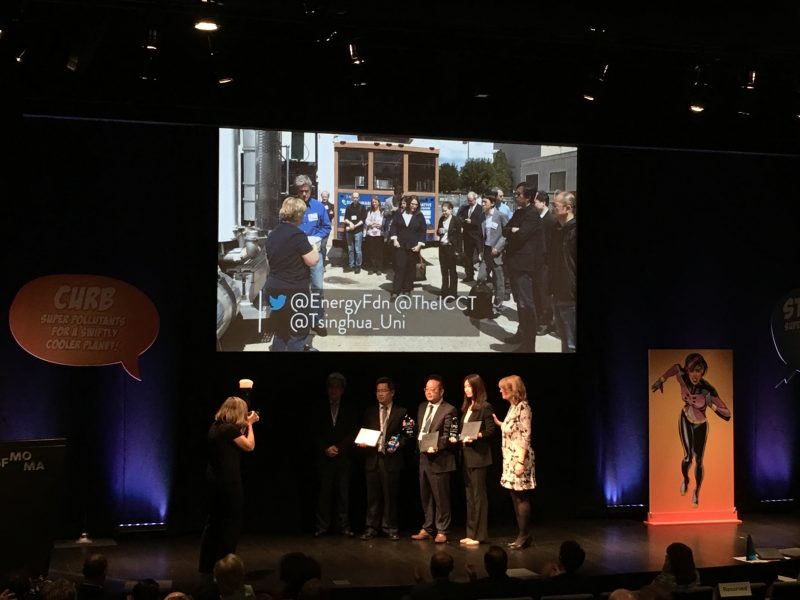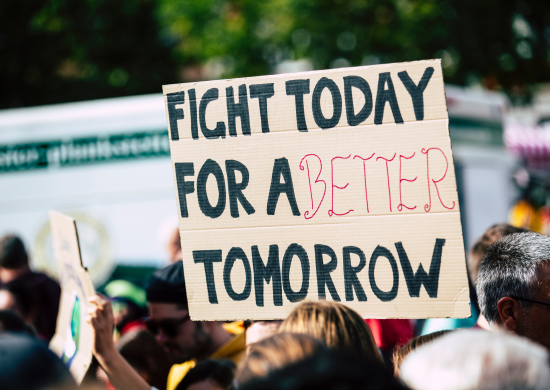Now that you’ve met our climate superhero, Super Swift, we’d like to talk about some real-life superheroes taking fast action in the climate world.
This past Tuesday, the Pisces Foundation co-hosted Super Pollutant Day spotlighting actions to cut climate “super pollutants,” like methane, black carbon, and HFCs. Scientists, policymakers, and leaders from civil society and philanthropy shared their perspective on the opportunities to help limit temperature change to under 2 degrees C by mitigating super pollutants alongside carbon dioxide. The inspiring proceedings can be seen here. The day culminated in a ceremony presenting the 2018 Climate and Clean Air Awards.
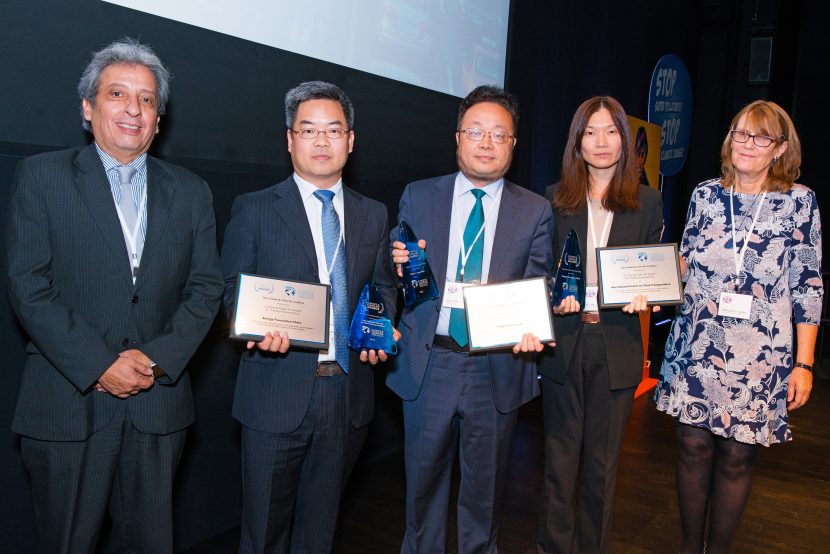
The efforts of two Pisces Foundation grantees—Energy Foundation China (EFC) and the International Council on Clean Transportation (ICCT)—to dramatically reduce black carbon from diesel trucks and buses was recognized with a Climate and Clean Air Award for transformative policy. The policy, China VI, requires all new heavy-duty diesel vehicles to be outfitted with a diesel particle filter starting in 2020.
EFC and ICCT share this award with China’s Ministry of Ecology and Environment (MEE), the lead policy maker; MEE’s Vehicle Emission Control Center; and Tsinghua University. The number of organizations receiving the award reflects the importance of collaboration in achieving major policy change.
To gain more insight into their collaborative efforts, our Climate and Energy Senior Program Officer, Fanta Kamakaté, interviewed Huiming Gong who directs EFC’s Transportation Program and Hui He who leads the ICCT work in China.
Fanta Kamakaté: How long have you been working together and what have been your respective roles in your collaboration?
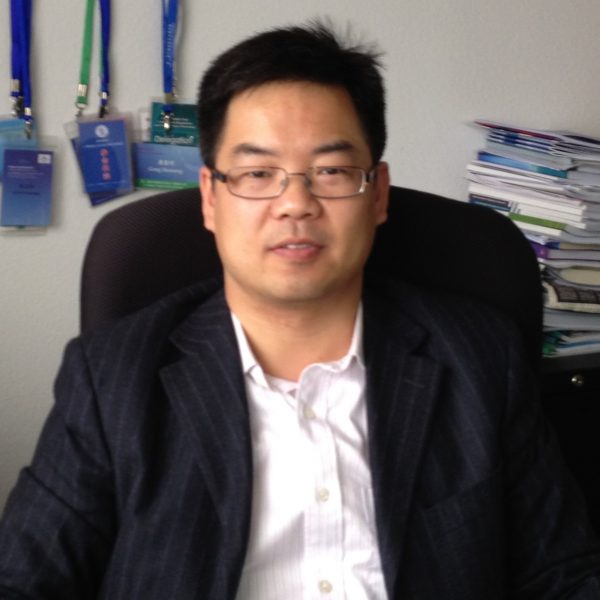
Huiming Gong: The Energy Foundation China (EFC), a grantmaking charity dedicated to China’s sustainable energy development, has worked with the International Council on Clean Transportation (ICCT) since ICCT’s founding in 2001, a couple years after the EFC was established.
Fanta: What were your original objectives in addressing black carbon from transportation in China? Did they change over time?
Huiming: Our original joint objectives were to improve air quality and protect public health by cutting down transportation emissions. We pursued the goal unwaveringly, although the strategy has been adjusted and tactics changed over time.
 Hui He: Our first joint project towards these goals started in 2004 and focused on vehicle fuel standards that were lagging behind vehicle emissions standards. Since then, we joined hands to push forward more stringent standards for vehicles and fuel, as well as in-use programs. Now, the newly adopted China VI vehicle emissions standards are among the most stringent in the world and the gap between vehicle standards and fuel standards has been closed.
Hui He: Our first joint project towards these goals started in 2004 and focused on vehicle fuel standards that were lagging behind vehicle emissions standards. Since then, we joined hands to push forward more stringent standards for vehicles and fuel, as well as in-use programs. Now, the newly adopted China VI vehicle emissions standards are among the most stringent in the world and the gap between vehicle standards and fuel standards has been closed.
Huiming: But our work is not done, EFC and ICCT’s collaboration continues, only now with a focus on standards enforcement and the nonroad sector, which is also a significant source of black carbon.
Fanta: What were the biggest advantages in carrying out the work in collaboration?
Hui: EFC has a great vision for how they can support China’s sustainable development, is very connected with policymakers and domestic think tanks, and deeply understands policy landscapes and dynamics in China. Accordingly, when a policy window opens, they make precise and accurate funding decisions. Further, EFC is well positioned to help create opportunities for new policies by bringing government-affiliated think tanks to work with international organizations with technical expertise.
Huiming: ICCT has deep interdisciplinary and technical expertise and has rich experience in supporting this type of policy development around the world. For example, they are able to link the very detailed technical elements of a regulation to high-level air quality and health impact. When the local policymakers hit a barrier, ICCT can provide lessons from both the advanced markets as well as other developing regions.
Hui: EFC and ICCT perfectly complement each other. Such a combination bridges international expertise with local resources by providing the right information to the right people at just the right time.
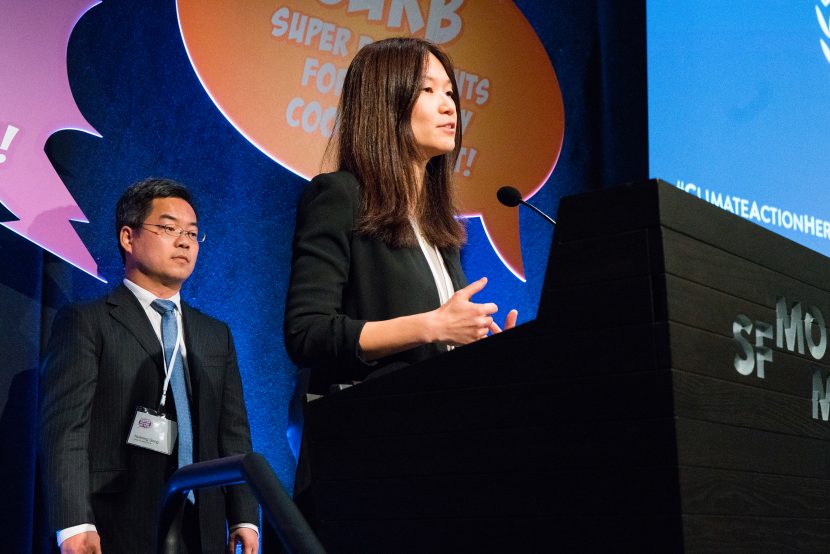
Fanta: What are the lessons you learned about collaboration? What might you have done differently?
Huiming: Aligning how we communicate with our respective partners about our collaborative work can be really important and really maximize the outcome. We learned this fairly recently, now we are doing better and better, but we could have collaborated on or planned for more coordinated outreach earlier.
Hui: EFC communicates with a broad audience representing different policy areas—transportation planners, city leaders, air quality managers, climate and energy regulators, etc. One way of aligning our outreach efforts is to ensure each team has key messages related to our collaborative work as well as broader priorities. Because many of the issues are linked, the benefits of coordinated outreach are profound. For example, when talking to a city, they are not just worried about the air quality impacts of growing vehicle fleets, they are concerned about congestion and climate impacts as well. They want comprehensive solutions. With aligned outreach, our teams can engage stakeholders at that level.
Fanta: What is still needed to achieve your goals? What are your hopes for the next 5 years?
Hui: China VI is only the start, a lot remains to be done to really make this policy fulfill its promises and ultimately clean up the transportation sector in China. We foresee that compliance and enforcement, making sure vehicles on the road are as clean as they are supposed to be, will be a key area to work on in China in the next few years. This is more complex than developing the standard itself and involves a broad range of capacities including legislative, institutional, technical, as well as consumer outreach. Expanded collaboration among NGOs and local think tanks with various expertise will be even more important.
Huiming: Aligning goals of NGOs and local think tanks is also important. The maritime transportation sector, ports and vessels, is emerging as another important contributor to local air pollution and greenhouse gas emission, including black carbon. EFC and ICCT will continue its work on advancing an international Emissions Control Area in China, which is home to seven out of top ten largest container ports in the world.
Fanta: Thank you, Hui and Huiming, and congratulations for working together to create a world where people and nature thrive together. Super Pollutant Day was a tremendous success for all, bringing attention to those potent pollutants and effective solutions that exist now.
This is the second blog in a series of blogs focused on the Global Climate Action Summit. The third and final blog with our summit wrap up will appear next week.
